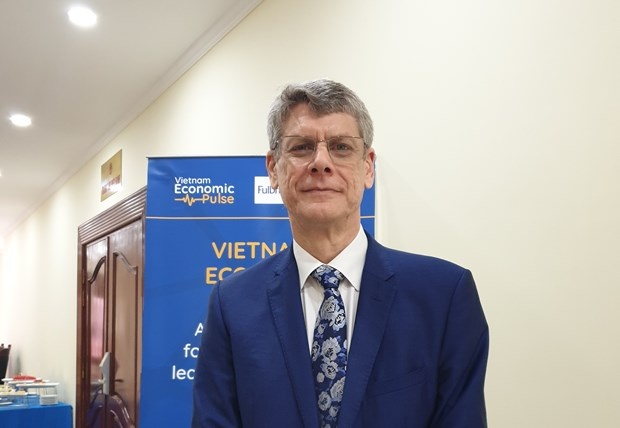Domestic resources – key to achieve development goals: UNDP expert
 |
| Professor Jonathan Pincus, UNDP Senior International Economist, grants an interview to the press on the sidelines of the Vietnam Economic Pulse forum virtually held on November 5. (Photo: VNA) |
Hanoi – Vietnam must consistently invest a larger share of national income if it is to achieve the targets set out in the ten-year development strategy of achieving upper middle-income status by 2030 and high-income status by 2045, while coping with formidable challenges of COVID-19, according to Professor Jonathan Pincus, UNDP Senior International Economist.
At the Vietnam Economic Pulse forum virtually held on November 5, Pincus laid stress on the important role of development finance for post-economic recovery in Vietnam, and said that domestic resource mobilisation is the key to increasing the supply of long-term finance for productive investment.
“Government must play a more active role mobilising resources and structuring incentives to lengthen time horizons, conserve scarce foreign exchange and encourage investment in socially desirable projects”.
Vietnam needs to maintain an investment rate between 35-40 percent of GDP to achieve the country’s economic ambitions, he said, adding the recovery relied heavily on foreign direct investment (FDI), which is expensive and generate foreign liabilities.
Therefore, rebalancing investment toward domestic sources should be a top priority of the Government for the rest of this decade.
He recommended Vietnam reform policy banks as they are a key for the country to sustain a very high rate of investment, which will be needed to recover from COVID-19 as well as other challenges such as climate change.
Talking with the press on the sidelines of the forum, Pincus said Vietnam should perform better in the public sector and financial institutions, adding it is time to have a serious look at banks for social policies to see how these institutions can be more effective.
Asked about Vietnam’s FDI attraction, he said Vietnam should look for projects that bring both new technologies and new products.
The expert said investment in productive activities, particularly in export, is good as export is vitally important to Vietnam since it helps the nation tap into global demand while the domestic market is still too small to drive investment and productivity growth.
Regarding Vietnam’s advantages for post-pandemic recovery, he said Vietnam has still been regarded as a country with tremendous export potential, saying Vietnam is a “really successful exporter of agricultural commodities.”
“There are a lot of emerging industries in Vietnam where Vietnam is still quite competitive and can develop those markets quite quickly.”
Moreover, Vietnam has “a very stable macro situation, very stable wages, very stable exchange rate,” which, Pincus said, helps to build confidence of investors.
National economy expected to grow nearly 2 percent this year
Vietnam’s economy is expected to recover quickly in the fourth quarter and the growth rate would stand at nearly 2 percent this year in the best conditions, said Dr Tran Toan Thang from the National Centre for Socio-economic Information and Forecasting (NCIF) at the Ministry of Planning and Investment.
In case the pandemic gets worse, the figure is projected at 0.8 percent, Thang said, adding that the country’s GDP growth rate is set at 5.8 to 6.7 percent in 2022 in the highest scenario.
According to Thang, urgent measures are needed in the remaining months of the year as well as the first months of 2022, especially those to contain the COVID-19 pandemic and remove roadblocks to the national economy.
Other experts at the forum said apart from measures to control the pandemic and increase vaccination coverage, Vietnam should work harder to support businesses and people to overcome difficulties in the short term.
However, attention should be paid to policy implementation cost and the efficiency of the policies, they noted.
Dr. Vo Tri Thanh, former deputy head of the Central Institute for Economic Management (CIEM), suggested the government continue with economic reform and restructuring programmes.
Meanwhile, businesses need to optimise opportunities presented by free trade agreements (FTAs) and step up innovation, creation and digital transformation, he added.
Pham Chi Lan, an experienced economist in Vietnam, who is also the Former General Secretary and Vice President of Vietnam Chamber of Commerce and Industry (VCCI), Member of the Prime Minister's advisory board, said that it is necessary to sketch out larger, longer and more rational support packages for local firms to recover their production since the previous ones still showed significant limitations such as complicated business procedures and impractical support.
Most importantly, businesses should receive support in improving their competitiveness and management capacity so that they can better develop in the future, she added.
What the stars mean:
★ Poor ★ ★ Promising ★★★ Good ★★★★ Very good ★★★★★ Exceptional
 Tag:
Tag:
Related Contents
Latest News
More News
- Citi economists project robust Vietnam economic growth in 2026 (February 14, 2026 | 18:00)
- Sustaining high growth must be balanced in stable manner (February 14, 2026 | 09:00)
- From 5G to 6G: how AI is shaping Vietnam’s path to digital leadership (February 13, 2026 | 10:59)
- Cooperation must align with Vietnam’s long-term ambitions (February 13, 2026 | 09:00)
- Need-to-know aspects ahead of AI law (February 13, 2026 | 08:00)
- Legalities to early operations for Vietnam’s IFC (February 11, 2026 | 12:17)
- Foreign-language trademarks gain traction in Vietnam (February 06, 2026 | 09:26)
- Offshore structuring and the Singapore holding route (February 02, 2026 | 10:39)
- Vietnam enters new development era: Russian scholar (January 25, 2026 | 10:08)
- 14th National Party Congress marks new era, expands Vietnam’s global role: Australian scholar (January 25, 2026 | 09:54)





















 Mobile Version
Mobile Version